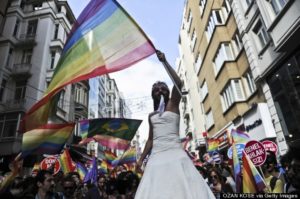
Recently, the US court of appeals sided with trans teen Gavin Grimm that he may use the restroom corresponding to his gender identity in his high school
As a workplace diversity consultant, with a specialty in LGBT (Lesbian, Gay, Bisexual, Transgender), and working with multiple businesses and organizations across North Carolina, I am deeply entrenched in our infamous anti-LGBT HB2 law passed earlier this year. Though it has multiple components (link to the actual bill), the one part that has grabbed the most attention is the provision that transgender individuals must use the restroom corresponding to the gender on their birth certificates in public facilities.
I have previously written two blogs about this bill
• “Why do we all need someone to hate on? … and now in North Carolina, it’s transgender people” on how I believe it is politics of hate and division which motivated HB2.
• “North Carolina’s HB2 – don’t boycott us, Cyndi Lauper-ize us!” which provides an alternative to boycotting our state.
Now that the law has been on the books for a while, I am following up with these “Five Impacts of HB2.” The first two are focused on broad economic impact and the final three are focused on various personal impacts.
1. Negative Business Impact: North Carolina has lost millions of dollars of revenue and thousands of jobs as various entertainment and sports events have been moved out of state, and various planned corporate expansions into North Carolina have been cancelled.
2. Impact on talent recruitment: I have heard from several of my clients that they are having a far more difficult time recruiting top talent for key positions, including enticing people to take internal transfers from other states. North Carolina is now viewed by many professionals as a “backward bigoted anti-diversity” state that they do not want to live nor raise a family in.
3. Overall safety and self-esteem of transgender individuals. This state law that singles out transgender people as “abnormal” and “not fit to use the bathroom of their gender” both stigmatizes transgender individuals as well as making them an increased target of hate crimes and ridicule. In addition, it diverts law enforcement from more pressing issues and increases the chances of vigilantism and violence.
4. Impact on transgender children. With a higher number of high profile transgender people “coming out” and more acceptance of transgender people in corporate America, more children are feeling safer about coming out to their parents and getting the support to live in their true gender. However, now in NC schools they are singled out in terms of restroom and locker room usage, and this undue attention also opens them up for additional schoolyard bullying.

Cisgender people (like female cancer survivors who lost their hair) my now be getting questioned about their rest room usage.
5. Impact on cisgender* people who may appear “gender non-conforming,” particularly “butch-looking” women or gender ambiguous people. For example, this law may make it very uncomfortable for a female cancer survivor who has a mastectomy and lost her hair who uses the women’s room and has her gender questioned.
This horrific law has caused so much harm at some many different levels, immediate and total repeal is truly the only reasonable option. And even with that, it may still take years for state economic and personal psychological harm to be reversed.
# # # # #
Cisgender* – refers to people who have no issue expressing their gender in the typical manner of someone born into that gender. Cisgender is to transgender as Straight (or heterosexual) is to gay
Take my transgender diversity 12 question self assessment to see if you organization is truly supporting transgender employees and clients.
I have added a new transgender consultant, Elaine Martin (link to the announcement) to assist me in providing transgender diversity workplace training, policy development and program management. Please contact me at [email protected] or 919-787-7315 to discuss how we can assist your organization around transgender diversity.


